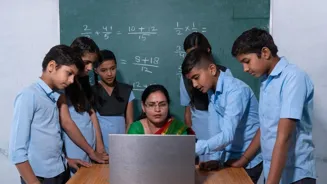By Deblina Chakraborty
The role of the teacher has shifted and evolved over centuries from the guru who was revered, to the mentor who guided, to the facilitator who opened doors to knowledge. On this Teachers’
Day, in an age where infinite information is instantly available, the question arises: What is the role of the teacher now?
I believe it is this: to guide, to humanise, and to help students make sense of what they encounter. The responsibility of the teacher is no longer to transmit facts, but to cultivate wisdom.
Teaching How To Think
The first task of education is to teach young people how to think, not what to think. Facts fade, but the ability to question, connect ideas, and distinguish truth from falsehood is enduring.
In an age where falsehoods spread rapidly across the internet—MIT research shows they travel six times faster than the truth—critical thinking has become a survival skill. Students must learn to examine evidence, weigh perspectives, and form reasoned judgments. This is not an additional skill; it is the very heart of education in the digital age.
Digital Wisdom And Media Literacy
Our students are bombarded with headlines, videos, and opinions every moment of the day. The challenge is no longer access to knowledge but filtering the signal from the noise. Teachers must therefore embed digital literacy into learning, helping students to ask: Who is behind this information? What motives shape it? When is it best to switch off? The most empowering mantra we can give them is simple: check, recheck, and double-check.
Emotional Intelligence And Collaboration
Machines may compute faster than us, but empathy, kindness, and resilience remain uniquely human. The workplaces of tomorrow demand collaboration, adaptability, and emotional resilience. The World Economic Forum has already identified complex problem-solving, critical thinking, and emotional resilience as top skills for the future.
This is why classrooms must be more than spaces for content delivery; they must be training grounds for empathy, respect, and
teamwork. By encouraging students to listen deeply, disagree respectfully, and support one another through setbacks, teachers become cultivators of humanity.
ALSO READ: Happy Teachers’ Day 2025: Best Wishes, Quotes, Images And WhatsApp Status To Share With Your Teachers
Adaptability And Lifelong Learning
The world is changing at an unprecedented pace. Entire industries are being reshaped by artificial intelligence and automation. The McKinsey Global Institute estimates that by 2030, more than 375 million workers may need to switch occupational categories due to automation. What students learn at fifteen may be obsolete by thirty.
The most important gift, therefore, is adaptability—the courage to unlearn, to relearn, and to approach change with curiosity rather than fear. Teachers must model lifelong learning themselves, showing students that education is never finished, only renewed.
Creativity And Imagination
Information alone does not create beauty or invention. It is imagination that turns facts into discoveries and stories into art. A wild question, a failed experiment, or a poem scribbled in the margin may contribute more to a child’s growth than a perfect answer ever could.
As the world becomes more dependent on algorithms and automation, creativity will remain the realm where human beings cannot be replaced. Encouraging boldness, originality, and play is one of teaching’s highest callings.
Ethics And Values
Knowledge without values can be dangerous. Infinite information without integrity can lead to exploitation, polarisation, or the misuse of technology. Teachers must therefore help students cultivate ethics: honesty, responsibility towards society, and the courage to stand up for what is right.
Global education frameworks, including the UN’s Sustainable Development Goal 4 on quality education, emphasise sustainability, inclusivity, and citizenship, reminding us that education is about stewardship of the world we live in.
Human Connection And Joy
Perhaps most importantly, teachers must preserve the human spirit of education. Learning is not only a ladder for personal success; it is a bridge to others. The stories of elders, the wisdom of tradition, and the bonds of friendship are lessons no search engine can provide.
Amid targets and exams, we must keep alive the joy of learning—the thrill of discovery, the wonder of a poem, the freedom of asking “why” simply for delight.
Beyond The Syllabus
The syllabus is no longer the ceiling of education. It is only the foundation. Beyond it lies the true task of teaching: to give students maps of knowledge and a compass for life.
In a world of infinite information, what our children need most is wisdom, courage, imagination, and heart. That is the role only a dedicated, forward-looking teacher can play—one that shapes the minds of students and the future of humanity itself.
(The Author is the Principal of Shiv Nadar School, Faridabad. Views expressed in the above piece are personal and solely those of the author. They do not necessarily reflect News18’s views.)














